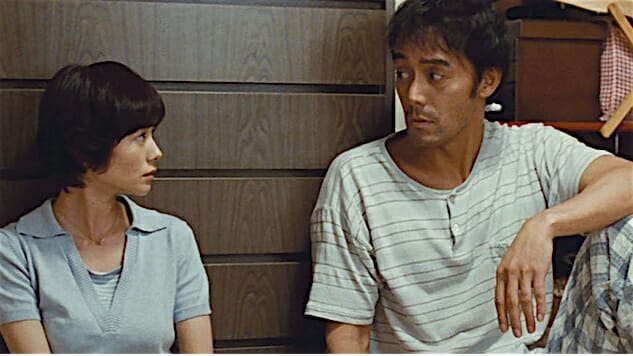
Depending on the filmmaker, After the Storm’s storyline could be grist for a dark comedy, a tear-jerking melodrama or a bilious character study. But because it springs from the mind of Japanese writer-director Hirokazu Kore-eda, this look at a middle-aged man who’s only slowly coming to the realization that he’s a right bastard is gentle, wistful—serene even. The creator of deceptively tranquil family dramas such as Like Father, Like Son and Our Little Sister, Kore-eda aims for the sentimental, but not without acknowledging the real pain and wretchedness in the world—especially when it’s exhibited by those closest to us. People are presented as basically decent in After the Storm in part because Kore-eda tries to see the best in his characters—even when he knows they probably don’t warrant such optimism.
The film stars Hiroshi Abe (who previously appeared in Kore-eda’s I Wish) as Ryota. Years ago, he was a novelist of some acclaim—he even won a prestigious literary prize—but lately, the muse has run dry, leaving Ryota busily tending to his gambling addiction while taking a job as a private detective.
What’s most effective initially about After the Storm is how Kore-eda tricks you into thinking his main character is sympathetic. With his kindly face, Ryota radiates an unassuming sweetness, and when we first meet him, he’s checking in on his mother (Kore-eda regular Kilin Kiki) after his father’s recent death. But that positive initial impression turns out to be inaccurate—the broke bum is actually there to steal some money that’s hidden around the home. His unseemly conduct does not end there. Ryota and his P.I. partner make extra dough confronting the people they’ve been hired to trail, shaking them down for payouts so that he won’t reveal the incriminating evidence to his clients. And that’s when Ryota is not snooping on his ex-wife Kyoko (Like Father, Like Son’s Yoko Maki) to see who she’s dating now, even cajoling his 11-year-old son Shingo (Taiyo Yoshizawa) to question her about how serious this new relationship is.
The more we observe of Ryota, the more we dislike him. But Kore-eda presents him with a striking detachment, making it unclear precisely how he feels about Ryota. Likewise, Abe plays Ryota as a guy who doesn’t ever consider himself in the wrong. Whether throwing away money at the track that he needs to pay Kyoko alimony or deceiving those around him about the new book he’s not really writing, Ryota has gotten so used to lying and rationalizing that he can’t see his situation clearly anymore.
But Ryota has his reasons—at least, he thinks he does. The death of his father exerts a hold on every member of his family (including his sister, played by Satomi Kobayashi), but Ryota seems most complicatedly connected to the deceased. Like his dad, Ryota has some skill as a writer—and is terrible with money—and in the actor’s sad, resigned face there’s an indication that Ryota’s financial and professional flailing is learned behavior from his old man. Add to that the fact that Ryota’s father never really approved of his literary work, and After the Storm has a faint but persistent resentment coursing through it. Not that Ryota ever expresses it directly to his mom—he’d rather go through her place while she’s away, looking for money he can snag.
That passive-aggressive discord—and the lingering impression that nobody on screen is particularly happy—is a constant in Kore-eda’s films, which are often described as being lightweight or mawkish. In a sense, that’s true—his movies drift through the air like untroubled clouds—but After the Storm demonstrates how often his characters decide to pretend to make the best of things, only to exacerbate their untenable circumstances. Nobody rants in this film—there’s never a big, cathartic monologue that breaks the faint tension—but After the Storm’s quiet anguish is sadder because Ryota and those around him just allow it to fester, passing from one generation to the next.
If this melancholy, troubled tone is endemic in Kore-eda’s work, so is his close chronicling of family dynamics. While Ryota fears turning into the same terminal disappointment as his father—or, perhaps, the disappointment he perceived him to be—he tries to win Shingo’s affection, buying him gifts to assert his supremacy over his ex’s new boyfriend. In Ryota’s mind, it’s how to be close to his boy in a way his father never was with him, but After the Storm knows better, recognizing all the ways that he’s failing his kid—and also how, like its own kind of genetic gravity, Ryota is becoming his old man, unable to correct the mistakes of the past. But there’s no scorn in Kore-eda’s depiction of Ryota’s transformation: The middle-aged man will come to understand how little he knew about his dad and also why he still craves connection to him, even though he thought he didn’t.
After the Storm doesn’t possess the finely tuned tragedy of 2004’s Nobody Knows, still Kore-eda’s best film, and its lessons about fathers and sons are hardly groundbreaking. But Kore-eda’s patience towards Ryota is both touching and despairing. After the Storm shows this man more kindness than perhaps he deserves, but the film has no illusions: Only Ryota can pull himself out of his own hole. But that’s the thing about having faith in people—it makes it that much easier for them to keep breaking your heart.
Director: Hirokazu Kore-eda
Writer: Hirokazu Kore-eda
Starring: Hiroshi Abe, Yoko Maki, Taiyo Yoshizawa, Kilin Kiki, Satomi Kobayashi
Release Date: March 17, 2017 (New York/Los Angeles)
Tim Grierson is chief film critic for Paste and the vice president of the Los Angeles Film Critics Association. You can follow him on Twitter.